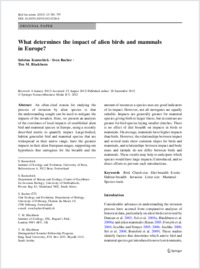What determines the impact of alien birds and mammals in Europe?
- Kumschick, Sabrina Department of Botany and Zoology, Centre of Excellence for Invasion Biology, University of Stellenbosch, South Africa
- Bacher, Sven Unit Ecology and Evolution, Department of Biology, University of Fribourg, Switzerland
- Blackburn, Tim M. Institute of Zoology, ZSL, Regent’s Park, London, UK - Distinguished Scientist Fellowship Program, King Saud University, Riyadh, Saudi Arabia
-
28.09.2012
Published in:
- Biological Invasions. - 2013, vol. 15, no. 4, p. 785-797
English
An often-cited reason for studying the process of invasion by alien species is that the understanding sought can be used to mitigate the impacts of the invaders. Here, we present an analysis of the correlates of local impacts of established alien bird and mammal species in Europe, using a recently described metric to quantify impact. Large-bodied, habitat generalist bird and mammal species that are widespread in their native range, have the greatest impacts in their alien European ranges, supporting our hypothesis that surrogates for the breadth and the amount of resources a species uses are good indicators of its impact. However, not all surrogates are equally suitable. Impacts are generally greater for mammal species giving birth to larger litters, but in contrast are greater for bird species laying smaller clutches. There is no effect of diet breadth on impacts in birds or mammals. On average, mammals have higher impacts than birds. However, the relationships between impact and several traits show common slopes for birds and mammals, and relationships between impact and body mass and latitude do not differ between birds and mammals. These results may help to anticipate which species would have large impacts if introduced, and so direct efforts to prevent such introductions.
- Faculty
- Faculté des sciences et de médecine
- Department
- Département de Biologie
- Language
-
- English
- Classification
- Biological sciences
- License
-
License undefined
- Identifiers
-
- RERO DOC 30409
- DOI 10.1007/s10530-012-0326-6
- Persistent URL
- https://folia.unifr.ch/unifr/documents/302520
Statistics
Document views: 228
File downloads:
- Document: 165
